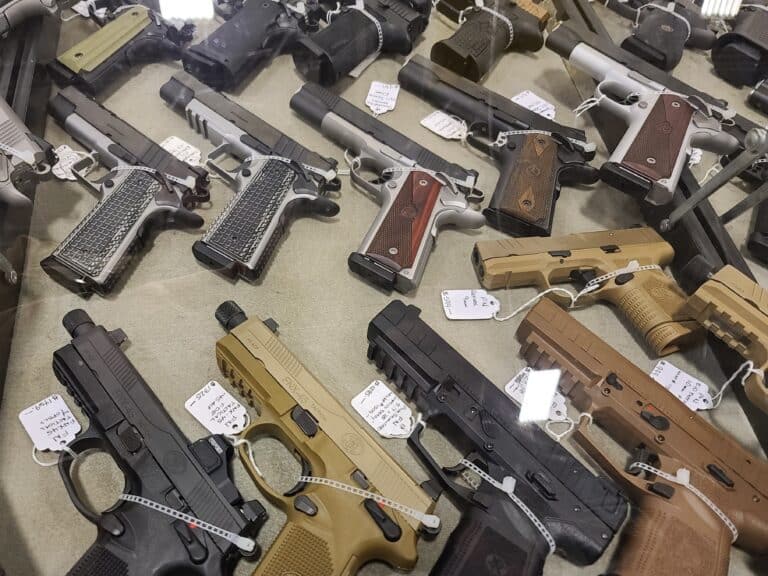Are age-based restrictions on gun rights for young adults constitutional? Or are they incompatible with the right of the people to keep and bear arms? The answer, it seems, depends on your view of history.
A three-judge panel for the Third Circuit Court of Appeals contributed to the recent trend of federal courts casting doubt on gun restrictions for adults under 21 on Thursday. It struck down a Pennsylvania law prohibiting that group from carrying firearms during emergency declarations.
“Through the combined operation of three statutes, the Commonwealth of Pennsylvania effectively bans 18-to-20- year-olds from carrying firearms outside their homes during a state of emergency,” Judge Kent A. Jordan wrote in Lara v. Comm’r Pa. State Police. “The words ‘the people’ in the Second Amendment presumptively encompass all adult Americans, including 18- to-20-year-olds, and we are aware of no founding-era law that supports disarming people in that age group.”
Some courts had already cast a skeptical eye toward age-based gun restrictions even before the Supreme Court’s 2022 New York State Rifle & Pistol Association v. Bruen decision. In 2021, a Fourth Circuit panel ruled against the federal under-21 handgun sales ban. Then a Ninth Circuit panel struck down California’s under-21 semi-automatic rifle sales ban in early 2022. But such rulings have only accelerated since the High Court handed down its history-based test for Second Amendment cases.
In addition to the Third Circuit, federal judges in Texas, Tennessee, and Minnesota have all ruled against carry restrictions for 18-20-year-olds using the Bruen analysis. Meanwhile, federal judges in Virginia, Colorado, and West Virginia have all done the same for gun sales restrictions on the same age range.
However, the federal judiciary hasn’t been unanimous on the question. A federal judge out of Louisiana ruled to uphold the federal handgun sales ban to adults younger than 21 in December 2022. In March of last year, a three-judge panel for the Eleventh Circuit upheld Florida’s ban on gun sales for adults under the age of 21 in a since-vacated opinion. Meanwhile, a California federal judge last month upheld California’s semi-automatic rifle sales ban for 18-20-year-olds in a rehearing of the same case the Ninth Circuit ruled on pre-Bruen.
The central distinction differentiating the rulings has been the historical timeframe deemed relevant by the judges in each case.
Those that have limited their historical inquiry or otherwise given greater weight to historical laws at or near the Founding have tended to strike down young adult gun restrictions. That’s because not only is there a dearth of many true Founding-era gun laws tailored toward 18-20-year-olds, but those that did exist tended to support the idea of at least certain members of that age group being armed.
“Against that conspicuously sparse record of state regulations on 18-to-20-year-olds at the time of the Second Amendment’s ratification, we can juxtapose the Second Militia Act, passed by Congress on May 8, 1792, a mere five months after the Second Amendment was ratified on December 15, 1791,” Judge Jordan wrote. “The Act required all able-bodied men to enroll in the militia and to arm themselves upon turning 18. That young adults had to serve in the militia indicates that founding-era lawmakers believed those youth could, and indeed should, keep and bear arms.”
On the other hand, judges that have emphasized more recent history surrounding the time of the Fourteenth Amendment’s ratification in 1868 have almost unanimously found age-based gun restrictions constitutional. Indeed, a review of historical firearms laws reveals a plethora of state-based restrictions on the sale or carrying of certain weapons to persons under the age of 21 beginning in the 1870s.
“Between the Fourteenth Amendment’s ratification and the close of the nineteenth century, at least sixteen states and the District of Columbia joined Alabama, Kentucky, and Tennessee—a total of at least twenty jurisdictions—in banning sales of firearms to 18-to-20-year-olds,” Eleventh Circuit Judge Robin Rosenbaum wrote in NRA v. Bondi. “It’s clear that the public understanding of the Second Amendment at the time of the Fourteenth Amendment’s ratification—as demonstrated by the wealth of Fourteenth Amendment-Ratification Era analogues for Florida’s law—permitted the states to limit the sale of firearms to those 21 and older.”
Judges and legal advocates who support an emphasis on history limited at or near the Second Amendment’s ratification in 1791 argue that the amendment’s public meaning should be fixed according to how it was understood by those who adopted it. They contend that laws passed contemporaneously provide the best context for how the Founding-era understood the Second Amendment’s limits.
By contrast, judges and advocates on the other side of the question argue that the era surrounding the Fourteenth Amendment’s ratification provides important context because that amendment supplied the legal vehicle for incorporating the Second Amendment’s protections to the states. Therefore, they argue, laws passed by the same governments that ratified the Fourteenth Amendment should be given equal weight to Founding-era laws for informing the public understanding of gun rights protections.
The Supreme Court, in its Bruen opinion, left some degree of ambiguity as to whether laws dating near the Fourteenth Amendment’s ratification should be given near equal weight to those at the time of the Founding.
“We have made clear that individual rights enumerated in the Bill of Rights and made applicable against the States through the Fourteenth Amendment have the same scope as against the Federal Government,” Justice Clarence Thomas wrote. “And we have generally assumed that the scope of the protection applicable to the Federal Government and States is pegged to the public understanding of the right when the Bill of Rights was adopted in 1791.”
“We also acknowledge that there is an ongoing scholarly debate on whether courts should primarily rely on the prevailing understanding of an individual right when the Fourteenth Amendment was ratified in 1868 when defining its scope,” he added. “We need not address this issue today because, as we explain below, the public understanding of the right to keep and bear arms in both 1791 and 1868 was, for all relevant purposes, the same with respect to public carry.”
Expect to see lower courts continue to diverge on this very question over age-based gun restrictions until that ambiguity is resolved.







Only Members can view comments. Become a member today to join the conversation.